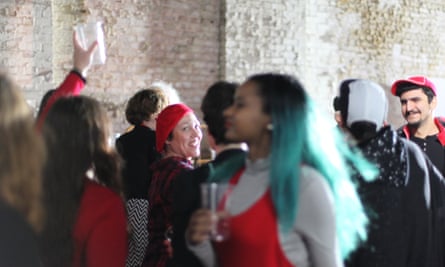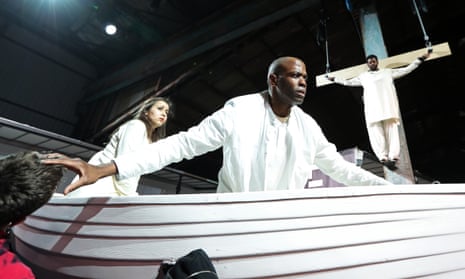No one could ever accuse the Birmingham Opera Company of lacking ambition. Over the last quarter-century its productions have spanned the whole history of opera, from Monteverdi’s Return of Ulysses to the British premiere of Stockhausen’s Mittwoch aus Licht, and the guiding principle behind every one has been the involvement of the people of Birmingham, not only working backstage in whatever unlikely venue the company has touched down in that year, but forming the onstage chorus and all the extras too.
BOC’s latest project – for each show is as much a community project as it is a production – is entirely bespoke. Wake has been conceived for this very particular mix of talents by Giorgio Battistelli, a composer we’ve heard little of in the UK since three of his theatre pieces (the slickly inventive Experimentum Mundi, and the more conventional but less convincing The Cenci and The Embalmer) were performed in London around the turn of the century. His list of operas and music-theatre works now stretches well beyond 20, though BOC’s claim that he is Italy’s greatest living composer – Sciarrino, anyone? Or Francesconi? – is rather stretching things.
With an English text by Sarah Woods, Wake is an updating of the New Testament story of Lazarus. It’s certainly been well tailored to the strengths of the Birmingham company, and the house style that director Graham Vick has devised for it. Even though there are some of the company’s familiar tics, there’s no sense of Wake having to be shoehorned into the template of mobile tableaux, which has become a bit too familiar. Here the use of different acting areas for each scene within the warehouse space (the same one used for the production of Tippett’s The Ice Break three years ago) seems much less contrived.

It lasts 75 minutes, without a break, though dramatically it’s uneven and oddly proportioned. There’s an overlong opening section in which the audience are given black veils to wear, members of the chorus wander between them muttering to themselves and a brass ensemble plays a mournful chorale. The final scene is equally protracted as Jesus is crucified, and the restored Lazarus and his sisters, Mary and Martha, are steered around the auditorium in a boat. In between, the biblical essentials of the story are compressed, so the moment of Lazarus’s return to life seems far less climactic than perhaps it should. Though, in what is effectively a non-acoustic space, much of the text is hard to catch. The opera, and Vick’s production, seem much more concerned with the effect of Lazarus’s return and what it provokes among his people and those oppressing them than with the miracle itself.
Stylistically, Battistelli’s score seems to be rooted somewhere between Berio and Stockhausen, but it’s eclectic, too, with a lapse into Straussian lushness at one point and a hint of the spiritual at another. Jonathon Heyward conducts an ensemble overwhelmingly dominated by woodwind and brass, with three percussionists stationed around the performing space too. There are four protagonists: Joshua Stewart is Lazarus, Elliott Carlton Hines is Jesus, and Nardus Williams and Mimi Doulton are the sisters Martha and Mary, who get the most rewarding vocal lines. But as so often in these productions it’s the involvement of the non-professional performers, acting and singing, who give the evening its unique atmosphere.
- Wake is at B12 Warehouse, Birmingham, until 20 March. Box office: 0121-246 6634.

Comments (…)
Sign in or create your Guardian account to join the discussion